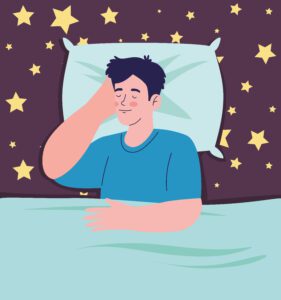We often underestimate just how much sleep quality shapes our daily lives. A restful night sets the stage for sharper thinking, steadier moods, and healthier energy levels. But when nights are restless, mornings feel heavy, and mental fog lingers throughout the day, even the simplest tasks can feel draining.
In today’s busy world, many people know the frustration of poor sleep — whether from stress, lifestyle choices, or hidden health conditions. The good news is that small, consistent habits can transform your nights and help bring mental clarity back into focus.
This article explores how to improve sleep quality through simple yet powerful steps, how sleep connects with brain function, and why balance in rest leads to greater well-being.
Table of Contents
ToggleIntroduction: Why Sleep Quality Matters More Than Hours Slept
It’s common to think sleep is only about how many hours we get. But sleep quality — the depth, consistency, and restfulness of sleep — is what truly determines how refreshed we feel. You might sleep 8 hours yet still wake up tired if the sleep wasn’t restorative.
Good-quality sleep supports memory, concentration, decision-making, and even emotional stability. It is closely tied to the mental clarity meaning — the ability to think clearly, make decisions with ease, and stay focused throughout the day. Poor sleep, on the other hand, is linked to irritability, forgetfulness, and even risks of conditions like sleep apnea and chronic fatigue.

The question then becomes: how to improve sleep quality without relying on quick fixes? The answer lies in small, daily habits that build long-term balance.
Habit 1: Create a Consistent Sleep Routine
Your body has an internal clock called the circadian rhythm. This rhythm thrives on consistency. Going to bed and waking up at the same time each day helps regulate hormone cycles and improves overall sleep quality.
Think of this routine as training your body to expect rest at a certain time. Over time, falling asleep becomes easier, and waking up feels more natural. This habit is especially powerful for people who struggle with conditions like sleep paralysis or irregular sleep patterns, since it signals safety and stability to the brain.
Habit 2: Limit Blue Light Before Bed
Screens are everywhere — from phones to TVs — but late-night scrolling is one of the biggest enemies of restful sleep. Blue light from devices suppresses melatonin, the hormone that signals your body to wind down.
Reducing screen time an hour before bed, or switching to “night mode,” can significantly improve sleep quality. Instead of scrolling, try reading a calming book, gentle stretching, or listening to soft music. These alternatives not only prepare your body but also clear the mental clutter that blocks mental clarity the next day.
Habit 3: Optimize Your Sleep Environment
Your bedroom should feel like a restful sanctuary. Small adjustments such as dimming the lights, keeping the room cool, and reducing noise can make a big difference.
Even subtle issues, like an uncomfortable pillow or mattress, can disrupt sleep cycles. Those struggling with sleep apnea often benefit from positioning aids or supportive bedding that keeps airways clear.
When your environment is aligned with rest, you’ll notice not only deeper sleep but also more refreshing mornings where mental clarity meaning turns into lived reality.
Habit 4: Be Mindful of Evening Nutrition
Food and drink play a surprising role in how well we sleep. Heavy meals, caffeine, and alcohol close to bedtime can interfere with deep sleep. Caffeine, in particular, lingers in the system for hours, reducing sleep quality and increasing restlessness.
On the other hand, light snacks like warm milk, bananas, or chamomile tea can help calm the body. People exploring how to improve sleep quality often find that adjusting mealtime habits makes a noticeable difference in both sleep depth and energy levels upon waking.
Habit 5: Incorporate Relaxation Rituals
Stress is a common cause of restless nights. Building a relaxation ritual — such as journaling, meditation, or gentle yoga — helps the body shift into “rest mode.”
These rituals lower cortisol (the stress hormone) and make falling asleep easier. For those who experience occasional sleep paralysis, calming practices can reduce nighttime anxiety and minimize episodes. More importantly, they set the foundation for waking up with sharper focus and greater balance in mental health.
Habit 6: Exercise — But at the Right Time
Physical activity is one of the best natural tools for how to improve sleep quality, but timing matters. Morning or afternoon exercise boosts energy during the day and promotes deeper sleep at night.
Exercising too close to bedtime, however, may keep the body too alert for rest. For people dealing with sleep apnea, regular physical activity can also strengthen breathing patterns, reducing symptoms. The long-term result? Better nights, clearer mornings, and enhanced overall wellness.
Habit 7: Listen to Your Body and Seek Support When Needed
Sometimes, despite good habits, sleep problems persist. Conditions like sleep apnea or chronic insomnia may require medical evaluation and support. Recognizing when to seek help is a sign of strength, not weakness.
Additionally, reflecting on mental clarity meaning in your own life can highlight how sleep is affecting your daily function. If focus, memory, or mood consistently feel “off,” it may be worth exploring both lifestyle and professional support options.

Lifestyle Factors That Affect Sleep Quality
Beyond bedtime habits, daily lifestyle choices also shape sleep quality. Stress management, balanced nutrition, and adequate hydration all play subtle but important roles.
Chronic stress often shows up at night, leading to tossing, turning, or waking up frequently. Similarly, poor nutrition or over-reliance on stimulants like caffeine can push the body into an unbalanced state. People with low vitamin D or deficiencies in magnesium also report difficulties with rest, showing how wellness and sleep are deeply interconnected.
While this isn’t often discussed, nutrient balance is critical for how to improve sleep quality. Foods rich in tryptophan, magnesium, and melatonin can support the body’s natural rest cycles. Daytime exposure to sunlight also helps regulate circadian rhythms, signaling the brain when it’s time to feel alert versus sleepy.
For some, supplements like magnesium or melatonin may be helpful, but these should be used carefully. More importantly, combining food, sunlight, and mindful supplementation offers a natural pathway toward deeper, more restorative rest.
The Warning Signs of Poor Sleep Quality
Poor sleep doesn’t always show up as simply “feeling tired.” Often, the signs are subtle at first, then build up over time. Recognizing these warnings can help you take steps before lack of rest begins to affect your overall health.
Morning Fatigue That Lingers
If you wake up groggy even after spending 7–8 hours in bed, it could mean your sleep cycles are being disrupted. Rest is not just about quantity — it’s about sleep quality.
Irritability and Mood Swings
Sleep acts as the brain’s reset button. Without it, emotions can feel unstable. Quick irritability, frequent mood changes, or feeling emotionally drained are common outcomes of restless nights.
Trouble Focusing and Forgetfulness
When sleep is poor, memory suffers. Misplacing items, struggling to focus at work, or forgetting conversations are clear signs your brain isn’t resetting properly during the night.
Physical Red Flags
Snoring, waking up gasping, or feeling short of breath may point to sleep apnea. Recurring sleep paralysis episodes also suggest disrupted rest. Even chronic headaches or unexplained fatigue can be tied to shallow sleep.
Ignoring these signals doesn’t just affect your mornings — it can weaken immunity, strain the heart, and reduce mental resilience over time. Listening to your body early makes a huge difference.
Sleep and Mental Clarity: The Unseen Connection
The link between sleep and mental performance is stronger than most people realize. Good rest fuels not only your body but also your mind’s ability to stay sharp.
What Mental Clarity Really Means
The mental clarity meaning is simple: the ability to think clearly, stay focused, and make decisions with confidence. It’s what allows you to cut through distractions and approach challenges with calm energy.

How Sleep Fuels the Brain
During deep sleep, the brain processes and organizes the day’s information. It also clears out waste that builds up while you’re awake — almost like a nightly “clean-up crew.” Without this, mental fog sets in.
The Cost of Poor Sleep Quality
When rest is shallow, brain fog takes over. You may feel slow, unmotivated, and easily stressed. Tasks take longer, patience runs thinner, and focus slips. Conditions like sleep apnea make this even worse by constantly breaking deep sleep cycles.
Why This Connection Matters
Sleep isn’t just about energy levels. It’s about your ability to think, react, and feel balanced. Improving sleep quality isn’t a luxury — it’s a foundation for sharper thinking and stronger mental health.
Practical Tips for Daily Balance
Small, steady changes in daily life can significantly improve sleep quality. The key is balance — aligning your environment, habits, and mindset.
Set a Consistent Sleep Schedule
Your circadian rhythm thrives on routine. Try going to bed and waking up at the same time every day. This “trains” your body to fall asleep faster and wake up more refreshed.

Create a Nightly Wind-Down Routine
Replace screen time with calming activities: reading, journaling, gentle yoga, or sipping chamomile tea. Even 10 minutes of deep breathing can prepare your body to relax.
Choose Sleep-Friendly Nutrition
Avoid caffeine or heavy meals late in the evening. Instead, pick light snacks that support rest — like bananas, almonds, or warm milk. Hydrate throughout the day, but cut back on excess fluids before bed.
Move Your Body — At the Right Time
Exercise reduces stress and helps regulate sleep cycles. Aim for morning or afternoon activity, not late-night workouts, which can overstimulate your nervous system.
Design a Restful Environment
A cool, dark, and quiet bedroom makes a big difference. Use blackout curtains, comfortable bedding, or white-noise machines if needed. Think of your bedroom as a sanctuary, not a workspace.
Balance doesn’t come from drastic changes but from small, sustainable shifts. Over time, these habits add up to deeper rest, clearer mornings, and stronger mental clarity.
Conclusion: Building a Healthier Rhythm
Improving sleep isn’t about chasing perfection. It’s about building small, sustainable habits that support the body’s natural rhythms. From creating a calm environment to balancing food and stress, each step builds toward a healthier balance.
Better sleep quality doesn’t just mean better nights — it means more focused days, greater resilience, and a stronger sense of well-being. With awareness and small daily actions, restful sleep becomes not just possible but natural.
Call-to-Action
Want more simple daily habits that improve sleep, sharpen focus, and build inner balance?
Explore the Health and Well-Being section of Healthy Gen Code (HGC) — where we share clear, practical guidance to help you live calmer, think clearer, and feel stronger each day.
We’re building a healthier generation, one mindful choice at a time.
Contact us here and support the journey with your presence, ideas, or even a kind word.
Let’s rest better, think clearer, and grow healthier — together, across every generation.
Sleep Quality and Clear Your Mind – Frequently Asked Questions
1. What does “sleep quality” really mean?
Sleep quality refers to how restful, deep, and consistent your sleep is — not just hours slept.
2. How is sleep quality different from sleep quantity?
Sleep quantity is the number of hours slept, while quality measures how restorative those hours are.
3. How to improve sleep quality naturally?
You can improve sleep by keeping a consistent bedtime, reducing blue light, and creating a calm environment.
4. What is the mental clarity meaning in relation to sleep?
Mental clarity means the ability to focus, think clearly, and make decisions with ease — all supported by quality sleep.
5. Can poor sleep cause brain fog?
Yes. Without restorative rest, the brain struggles to process information, leading to foggy thinking and slow reactions.
6. Does sleep apnea affect mental clarity?
Absolutely. Sleep apnea interrupts deep sleep cycles, which reduces mental sharpness and increases daytime fatigue.
7. How does sleep paralysis relate to sleep quality?
Sleep paralysis often occurs when sleep cycles are irregular or disrupted, reflecting poor sleep quality.
8. What are common warning signs of poor sleep quality?
Morning fatigue, irritability, forgetfulness, frequent waking, snoring, or headaches can signal disrupted rest.
9. Can stress lower sleep quality?
Yes. High stress raises cortisol levels, which delays sleep and reduces deep rest.
10. Does food affect sleep quality?
Yes. Heavy meals, caffeine, and alcohol before bed can reduce restfulness, while calming foods support better sleep.
11. How much sleep do adults need for mental clarity?
Most adults need 7–9 hours of restful sleep to support clear thinking and balanced moods.
12. Can lack of sleep worsen anxiety?
Yes. Poor sleep affects emotional regulation, which can heighten anxiety and mood swings.
13. What role does exercise play in sleep quality?
Regular physical activity supports deeper sleep, but exercising too close to bedtime can delay rest.
14. Can hydration impact sleep?
Yes. Dehydration can cause restlessness, while too much fluid before bed may disturb sleep with frequent urination.
15. Is napping good or bad for sleep quality?
Short naps (20–30 minutes) can restore energy, but long or late naps may disrupt nighttime sleep.
16. Does poor sleep affect memory?
Yes. During sleep, the brain consolidates memory — poor sleep reduces recall and learning ability.
17. How does blue light affect sleep quality?
Blue light from screens suppresses melatonin, making it harder to fall and stay asleep.
18. What is the connection between sleep quality and productivity?
Better sleep quality improves focus, decision-making, and work performance, while poor sleep causes errors and low energy.
19. Can improving sleep quality prevent health problems?
Yes. Good sleep reduces risks of heart disease, weakened immunity, and long-term cognitive decline.
20. What’s the first step to improving sleep quality today?
Start with one habit — like setting a fixed bedtime or turning off screens an hour before bed.
Sources
- https://www.healthline.com/nutrition/17-tips-to-sleep-better
- https://newsinhealth.nih.gov/2021/04/good-sleep-good-health
- https://www.health.harvard.edu/newsletter_article/8-secrets-to-a-good-nights-sleep
- https://www.nhs.uk/every-mind-matters/mental-wellbeing-tips/how-to-fall-asleep-faster-and-sleep-better/
Referral
- Get off using https://hostinger.in?REFERRALCODE=HGC
- Get off using the link here for buying Premium Web Hosting at Hostingrer https://cart.hostinger.com/pay/de220648-48ab-4d33-9c23-477a6764af14
- Get off using the link here for buying Cloud Startup at Hostingrer https://cart.hostinger.com/pay/fecdf014-ea49-431b-913a-88f30fe1db42

